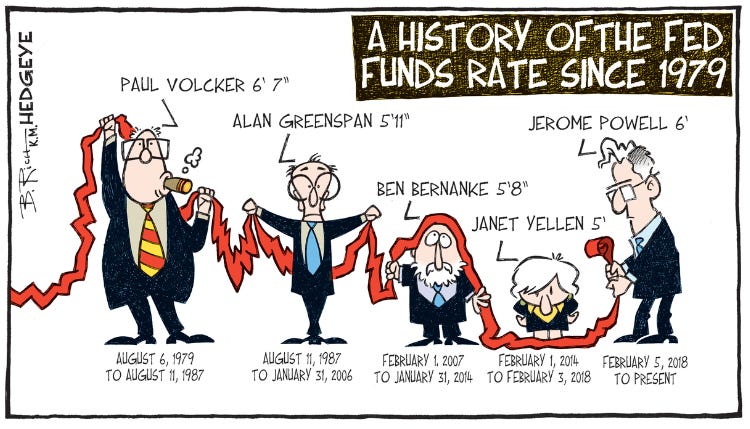Powell Sets New Pace for Fiscal Policy
Dear Investors,
Welcome to this week’s edition of the Myth of Money. If you would like to keep in closer touch, please reach out on X (formerly Twitter) below.
Fed's Decision at FOMC Meeting
At the recent Federal Open Market Committee (FOMC) meeting, chaired by Jerome Powell, the Federal Reserve made pivotal decisions with far-reaching implications.
Jerome Powell went into his press conference amid widespread market expectations that he’d channel his inner hawk, adding a dose of caution about sticky inflation without upsetting Wall Street too much. Indeed, there was even chatter that he might hint that he was open to additional tightening. But instead of a lash, the Fed offered a warm blanket.
Despite grappling with concerns surrounding persistent inflation, the FOMC opted to maintain the benchmark interest rates at the existing range of 5.25% - 5.50%. This decision came amidst concerns about persistently high inflation, with the Fed aiming to achieve its 2% target.
In a move aimed at preempting potential market volatility, the committee unveiled plans to taper Quantitative Tightening to reduce the balance sheet starting in June. This strategic maneuver seeks to avoid a recurrence of the turbulence witnessed in 2019, demonstrating the Fed's commitment to navigating economic challenges with caution and foresight.
Market Response and Speculation:
The Fed's decision at the FOMC meeting reverberated across financial markets, prompting varied responses and fueling speculation about future monetary policy actions. Leading up to the meeting, the cryptocurrency market experienced a notable upheaval, with Bitcoin briefly plummeting below $57,000 before staging a remarkable recovery, surging past the $60,000 mark once again.
The stock market rallied a few days later on reports suggesting a slowdown in job growth, with indices like the S&P 500 and Nasdaq Composite posting significant gains. Friday’s nonfarm payrolls report showed 175,000 jobs gained in April, below the 240,000 jobs expected by economists surveyed by Dow Jones. The unemployment rate edged up to 3.9%, versus 3.8% in the prior month, according to the Bureau of Labor Statistics. Wage figures also came in less than expected, an encouraging sign for inflation.
Investor Sentiment
While market expectations for rate cuts later in the year saw a modest uptick, sentiments largely aligned with the Fed's cautious stance. Investors are grappling with the delicate balance between inflationary pressures and economic growth prospects, navigating uncertainties surrounding future monetary policy actions and their impact on asset prices.
Following April’s weaker-than-expected job growth and moderating wage gains, traders are pricing in a second rate cut by the end of the year. Fed funds futures trading data suggests a nearly 50% likelihood of a 25 basis point rate cut in September, according to the CME Group’s FedWatch tracker of futures market pricing.
This Week By the Numbers 📈
Quick Facts:
China's $74 billion dumping of US treasuries since 2023
Bitcoin dips below $57,000 last week, while Coinbase integrates Bitcoin Lightning Network
Grayscale sees its first inflow into spot Bitcoin ETF ($63M) since its launch
Hong Kong's Bitcoin ETF market shows potential to double the size of the US market
Hong Kong-based asset managers invest $112 million in US-based spot Bitcoin ETF
Europe's BNP Paribas acquires shares of BlackRock spot Bitcoin ETF
BlackRock anticipates sovereign wealth funds, pension funds, and endowments to soon trade spot Bitcoin ETFs
Tether records $4.5 billion profit in Q1
PayPal integrates with Moonpay
NVIDIA stands out as the only stock to outperform BTC in the last decade
Apple highlights AI investments following earnings beat
Coinbase reports strong earnings despite a drop in its stock price
Tesla's $TSLA surges 15% in a single day, boosting its market cap by over $80 billion
US and G-7 announce $50 billion aid for Ukraine, funded by frozen Russian assets
Top Stories 🗞️
Binance crypto founder Zhao sentenced to four months in prison
Changpeng Zhao, the former chief executive of Binance, was sentenced on Tuesday to four months in prison after pleading guilty to violating U.S. laws against money laundering at the world's largest cryptocurrency exchange. Once considered the most powerful crypto industry figure, Zhao, known as "CZ," is the second major crypto boss to be sentenced to prison. The sentence imposed by U.S. District Judge Richard Jones in Seattle was significantly shorter than the three years sought by prosecutors, and below the maximum 1-1/2 years recommended under federal guidelines. It was also much lighter than the 25 years behind bars that Sam Bankman-Fried received in March for stealing $8 billion from customers of his now-bankrupt FTX exchange. Bankman-Fried is appealing his conviction and sentence. Still, prosecutors cheered the outcome of what had been a years-long investigation into Binance and Zhao, a billionaire who had been living beyond U.S. reach in the United Arab Emirates.
Japan’s currency falls to its weakest since 1990 against the dollar
The value of Japan’s currency has tumbled so much that for a moment on Monday it took 160 yen to equal $1. A few years ago, it took closer to 100 yen to make a U.S. dollar. The yen has been so weak that it’s back to where it was in 1990, shortly after Japan’s famous “bubble economy” burst. The yen has long been under pressure as the Bank of Japan kept interest rates remarkably low to encourage more inflation in its economy. The Bank of Japan’s latest decision on rates came on Friday, when it held interest rates steady. That helped spur this latest leg of weakness for the yen. The market may have been reacting to a lack of commitment by the Bank of Japan for more rate hikes in the near term, and the yen may remain under pressure into the third quarter of this year. That’s in part because of how solid the U.S. economy has remained. With inflation and the economy still higher than forecast, expectations are rising for the Federal Reserve to keep its main interest rate high for a while. That’s kept U.S. Treasury yields high and put upward pressure on the U.S. dollar’s value.
Turkey’s inflation accelerates to nearly 70% in April
Turkey’s inflation accelerated to 69.8% annually for the month of April, the Turkish Statistical Institute reported Friday. The highest consumer price increases year on year were in education, with a 103.86% jump, and hotels, cafes and restaurants, with an increase of 95.82%. On a monthly basis, Turkey’s inflation climbed 3.18%, led by price rises in alcoholic beverages and tobacco, and hotels, cafes and restaurants. April’s inflation rate marks the highest annual increase since November 2022, when inflation was around 85%. While an eye-watering figure, April’s nearly 70% CPI read was actually a smaller jump than many analysts had expected. But any hopes of interest rate cuts are a long way off, economists said. Turkey’s central bank has hiked its key interest rate to 50%, citing the continuing need to counter climbing inflation in the country. The bank said in March that “tight monetary stance will be maintained until a significant and sustained decline in the underlying trend of monthly inflation is observed.”
SEC charges Trump Media auditor with ‘massive fraud’ on hundreds of companies, imposes lifetime ban
The auditing firm for Trump Media and the auditor’s owner were charged Friday with “massive fraud” by the Securities and Exchange Commission for accounting work that affected more than 1,500 SEC filings, the federal regulator announced. The auditor, BF Borgers CPA, and its owner, Benjamin Borgers, have agreed to be permanently suspended from practicing as accountants before the SEC, and also agreed to pay a combined $14 million in civil penalties, without admitting or denying the allegations, the SEC said. The agency, calling BF Borgers a “sham audit mill,” said the company and its owner “deliberately systematically failed to conduct” audits and quarterly reviews incorporated in more than 1,500 SEC filings from January 2021 through June 2023 in accordance with Public Company Accounting Oversight Board standards.
Apple CEO Tim Cook boasts of future AI plans
Apple (AAPL) CEO Tim Cook took time during the company's second quarter earnings call on Thursday to drum up excitement for the iPhone maker's upcoming generative AI offerings. In his remarks, Cook told listeners that the company is bullish about the opportunities generative AI has to offer and that it is making significant investments in the technology. "We believe in the transformative power and promise of AI, and we believe we have advantages that will differentiate us in this new era including Apple's unique combination of seamless hardware, software, and services integration; groundbreaking Apple silicon with our industry leading neural engine; and our unwavering focus on privacy," Cook said. Ahead of the call, Apple reported better-than-anticipated earnings and revenue, though iPhone sales fell about 10% year over year.
My Top 10 Investment Ideas for 2024 🐸
This week, we are offering an additional free knowledge source - My Top 10 Investment Ideas for 2024, including picks across stocks and crypto, and my reasoning behind making those investments personally.
To receive this product, simply refer 3 friends using your unique shareable link 👇
Thank you for reading this week’s edition of the Myth of Money.🚀
Were you forwarded this email? Subscribe below.
Until next week,
Tatiana Koffman
About the Author: Tatiana Koffman
Hi there and thanks for reading! If you stumble upon my newsletter, you will notice that I write about money, economics, and technology. I hold a JD/MBA and spent my career in Capital Markets working across Mergers & Acquisitions, Derivatives, Venture Capital, and Cryptocurrencies. I write to make financial topics more accessible and create equal opportunity for the next generation of investors. I have personally invested in 20+ companies and funds (👉 my portfolio).





